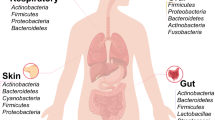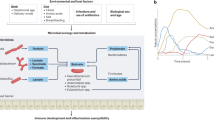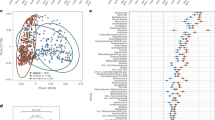Abstract
Background:
Several probiotic strains have been shown to enhance human resistance to infectious disease. It is speculated that these strains may impose this effect by excretion of anti-microbial components, by competing with pathogens for intestinal nutrients and/or mucosal adhesion sites or modulating the immune system.
Objective:
A parallel, double-blind, placebo-controlled 4-week intervention was performed in healthy males, to study the effect of a blend of probiotic bacteria (Lactobacillus helveticus Rosell-52, Lactobacillus rhamnosus Rosell-11, Bifidobacterium longum ssp. longum Rosell-175) and a probiotic yeast (Saccharomyces cerevisiae var boulardii CNCM I-1079) on enterotoxigenic Escherichia coli (ETEC) challenge. Primary outcomes studied were fecal ETEC excretion and total fecal output per day.
Subjects/Methods:
Subjects were randomized to the probiotic (5 × 109 colony-forming units (CFUs); twice daily; n=30) or placebo group (twice daily; n=30). After 2 weeks, subjects were orally challenged with a live attenuated ETEC (3 × 109 CFU), previously demonstrated to induce mild, short-lived symptoms of a foodborne infection. Before and after ETEC challenge, subjects collected 24 h fecal samples. Compliance to study guidelines, stool consistency (Bristol Stool Score), stool frequency, and frequency and severity of gastrointestinal (GI) complaints were recorded by the subjects on a Daily Record Questionnaire.
Results:
ETEC challenge induced a significant increase in fecal ETEC excretion in both groups. However, a statistically significant increase in fecal output was only observed in the probiotic group. ETEC challenge resulted in a decrease in the percentage of fecal dry weight, and an increase in reported Bristol Stool Score, stool frequency and GI complaints. Dietary probiotics significantly decreased the percentage of fecal dry weight. In addition, ETEC increased C-reactive protein, total secretory Immunoglobulin A (IgA) and Immunoglobulin G Colonization Factor Antigen II.
Conclusion:
Dietary probiotics did not increase resistance to oral attenuated ETEC challenge in human subjects.
This is a preview of subscription content, access via your institution
Access options
Subscribe to this journal
Receive 12 print issues and online access
$259.00 per year
only $21.58 per issue
Buy this article
- Purchase on Springer Link
- Instant access to full article PDF
Prices may be subject to local taxes which are calculated during checkout




Similar content being viewed by others
References
Field V, Gautret P, Schlagenhauf P, Burchard GD, Caumes E, Jensenius M et al. Travel and migration associated infectious diseases morbidity in Europe, 2008. BMC Infect Dis 2010; 10: 330.
McFarland LV . Diarrhoea associated with antibiotic use. BMJ 2007; 335: 54–55.
Schjorring S, Krogfelt KA . Assessment of bacterial antibiotic resistance transfer in the gut. Int J Microbiol 2011; 2011: 312956.
Agustina R, Kok FJ, van de Rest O, Fahmida U, Firmansyah A, Lukito W et al. Randomized trial of probiotics and calcium on diarrhea and respiratory tract infections in Indonesian children. Pediatrics 2012; 129: e1155–e1164.
McFarland LV . Meta-analysis of probiotics for the prevention of traveler's diarrhea. Travel Med Infect Dis 2007; 5: 97–105.
Sazawal S, Hiremath G, Dhingra U, Malik P, Deb S, Black RE . Efficacy of probiotics in prevention of acute diarrhoea: a meta-analysis of masked, randomised, placebo-controlled trials. Lancet Infect Dis 2006; 6: 374–382.
McFarland LV . Systematic review and meta-analysis of Saccharomyces boulardii in adult patients. World J Gastroenterol 2010; 16: 2202–2222.
Szajewska H, Skorka A, Dylag M . Meta-analysis: Saccharomyces boulardii for treating acute diarrhoea in children. Aliment Pharmacol Ther 2007; 25: 257–264.
Htwe K, Yee KS, Tin M, Vandenplas Y . Effect of Saccharomyces boulardii in the treatment of acute watery diarrhea in Myanmar children: a randomized controlled study. Am J Trop Med Hyg 2008; 78: 214–216.
Kurugol Z, Koturoglu G . Effects of Saccharomyces boulardii in children with acute diarrhoea. Acta Paediatr 2005; 94: 44–47.
Villarruel G, Rubio DM, Lopez F, Cintioni J, Gurevech R, Romero G et al. Saccharomyces boulardii in acute childhood diarrhoea: a randomized, placebo-controlled study. Acta Paediatr 2007; 96: 538–541.
Kollaritsch H, Holst H, Grobara P, Wiedermann G . [Prevention of traveler's diarrhea with Saccharomyces boulardii. Results of a placebo controlled double-blind study]. Fortschr Med 1993; 111: 152–156.
Bisson JF, Hidalgo S, Rozan P, Messaoudi M . Preventive effects of different probiotic formulations on travelers' diarrhea model in wistar rats: preventive effects of probiotics on TD. Dig Dis Sci 2010; 55: 911–919.
Bovee-Oudenhoven IM, Lettink-Wissink ML, Van Doesburg W, Witteman BJ, Van Der Meer R . Diarrhea caused by enterotoxigenic Escherichia coli infection of humans is inhibited by dietary calcium. Gastroenterology 2003; 125: 469–476.
Ten Bruggencate SJ, Bovee-Oudenhoven IM, Lettink-Wissink ML, Katan MB, van der Meer R . Dietary fructooligosaccharides affect intestinal barrier function in healthy men. J Nutr 2006; 136: 70–74.
Klein SM, Elmer GW, McFarland LV, Surawicz CM, Levy RH . Recovery and elimination of the biotherapeutic agent, Saccharomyces boulardii, in healthy human volunteers. Pharm Res 1993; 10: 1615–1619.
Levine MM, Ferreccio C, Prado V, Cayazzo M, Abrego P, Martinez J et al. Epidemiologic studies of Escherichia coli diarrheal infections in a low socioeconomic level peri-urban community in Santiago, Chile. Am J Epidemiol 1993; 138: 849–869.
Isidean SD, Riddle MS, Savarino SJ, Porter CK . A systematic review of ETEC epidemiology focusing on colonization factor and toxin expression. Vaccine 2011; 29: 6167–6178.
Heaton KW, Ghosh S, Braddon FE . How bad are the symptoms and bowel dysfunction of patients with the irritable bowel syndrome? A prospective, controlled study with emphasis on stool form. Gut 1991; 32: 73–79.
Porter CK, Riddle MS, Tribble DR, Louis Bougeois A, McKenzie R, Isidean SD et al. A systematic review of experimental infections with enterotoxigenic Escherichia coli (ETEC). Vaccine 2011; 29: 5869–5885.
Kollaritsch H, Paulke-Korinek M, Wiedermann U . Traveler's Diarrhea. Infect Dis Clin North Am 2012; 26: 691–706.
Rendi-Wagner P, Kollaritsch H . Drug prophylaxis for travelers' diarrhea. Clin Infect Dis 2002; 34: 628–633.
Croxen MA, Law RJ, Scholz R, Keeney KM, Wlodarska M, Finlay BB . Recent Advances in Understanding Enteric Pathogenic Escherichia coli. Clin Microbiol Rev 2013; 26: 822–880.
Ouwehand AC, Ten Bruggencate SJ, Schonewille AJ, Alhoniemi E, Forssten SD, Bovee-Oudenhoven IM . Lactobacillus acidophilus supplementation in human subjects and their resistance to enterotoxigenic Escherichia coli infection. Br J Nutr 2013; 1–9.
Corr SC, Hill C, Gahan CG . Understanding the mechanisms by which probiotics inhibit gastrointestinal pathogens. Adv Food Nutr Res 2009; 56: 1–15.
Castagliuolo I, Riegler MF, Valenick L, LaMont JT, Pothoulakis C . Saccharomyces boulardii protease inhibits the effects of Clostridium difficile toxins A and B in human colonic mucosa. Infect Immun 1999; 67: 302–307.
Paton AW, Jennings MP, Morona R, Wang H, Focareta A, Roddam LF et al. Recombinant probiotics for treatment and prevention of enterotoxigenic Escherichia coli diarrhea. Gastroenterology 2005; 128: 1219–1228.
Rund SA, Rohde H, Sonnenborn U, Oelschlaeger TA . Antagonistic effects of probiotic Escherichia coli Nissle 1917 on EHEC strains of serotype O104:H4 and O157:H7. Int J Med Microbiol 2013; 303: 1–8.
Acknowledgements
E Lucas, R Holleman, J Hoolwerf and S van Schalkwijk (NIZO Food Research, Ede, the Netherlands) are thanked for their support of study logistics, and assistance with laboratory analyses. M Kleerebezem (NIZO Food Research, Ede, the Netherlands) is thanked for critically reviewing the manuscript and E Alhoniemi (Pharmatest, Finland) is thanked for performing the statistical analysis. The study was funded by Lallemand Health Solutions Inc., Montreal, Canada.
Author Contributions
All authors have read and approved the final manuscript. SB, RB and TT designed the study. SB and EF conducted the study and analyzed the data. SB, SG, TT and RB wrote the paper. SB and TT had primary responsibility for final content.
Author information
Authors and Affiliations
Corresponding author
Ethics declarations
Competing interests
SB and EF declare no conflict of interest. SG and TT are employed by Lallemand Health Solutions Inc., Montreal, Canada, producer and marketer of Protecflor. RB is a consultant to Lallemand Health Solutions Inc.
Additional information
Disclosure
The sponsor was involved in the design of the study, interpretation of the data and writing of the manuscript. No external funding, apart from the authors’ institutions, was available for this study.
Registration
The trial was registered on ClinicalTrials.gov, NCT01709266.
Supplementary Information accompanies this paper on European Journal of Clinical Nutrition website
Supplementary information
Rights and permissions
About this article
Cite this article
Ten Bruggencate, S., Girard, S., Floris-Vollenbroek, E. et al. The effect of a multi-strain probiotic on the resistance toward Escherichia coli challenge in a randomized, placebo-controlled, double-blind intervention study. Eur J Clin Nutr 69, 385–391 (2015). https://doi.org/10.1038/ejcn.2014.238
Received:
Revised:
Accepted:
Published:
Issue Date:
DOI: https://doi.org/10.1038/ejcn.2014.238
This article is cited by
-
Characterization of the pathophysiological determinants of diarrheagenic Escherichia coli infection using a challenge model in healthy adults
Scientific Reports (2021)
-
Spatial and temporal modulation of enterotoxigenic E. coli H10407 pathogenesis and interplay with microbiota in human gut models
BMC Biology (2020)



